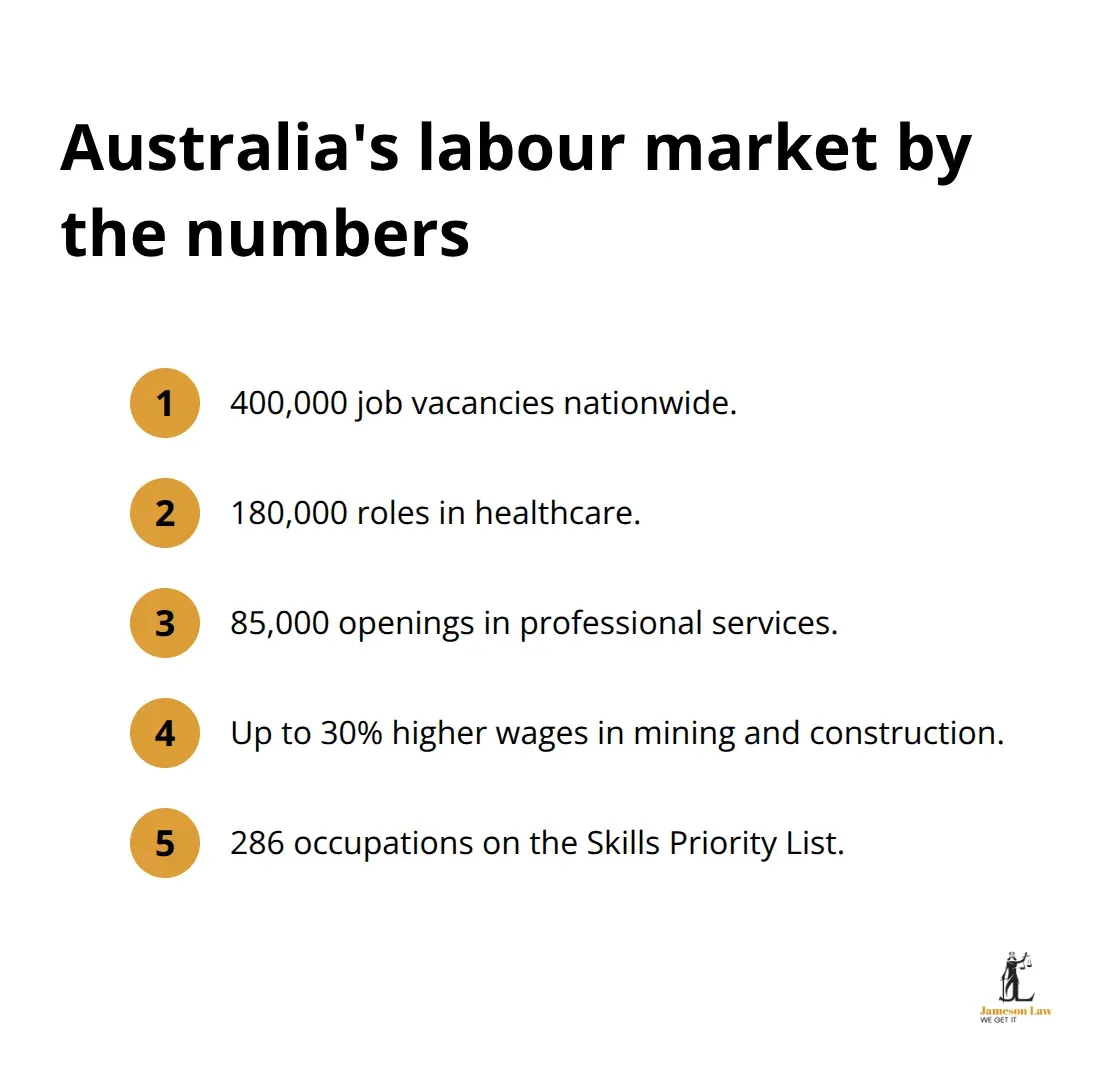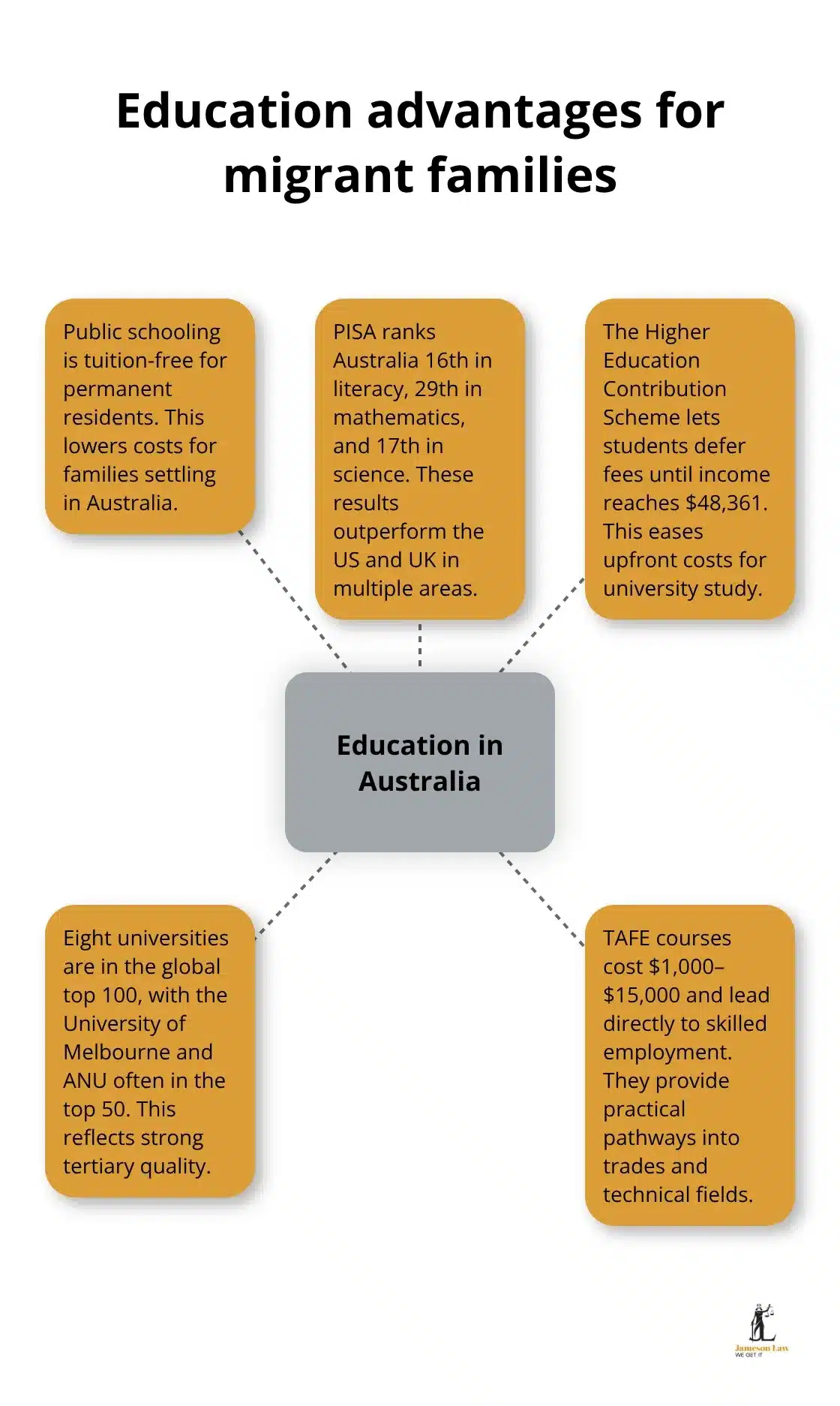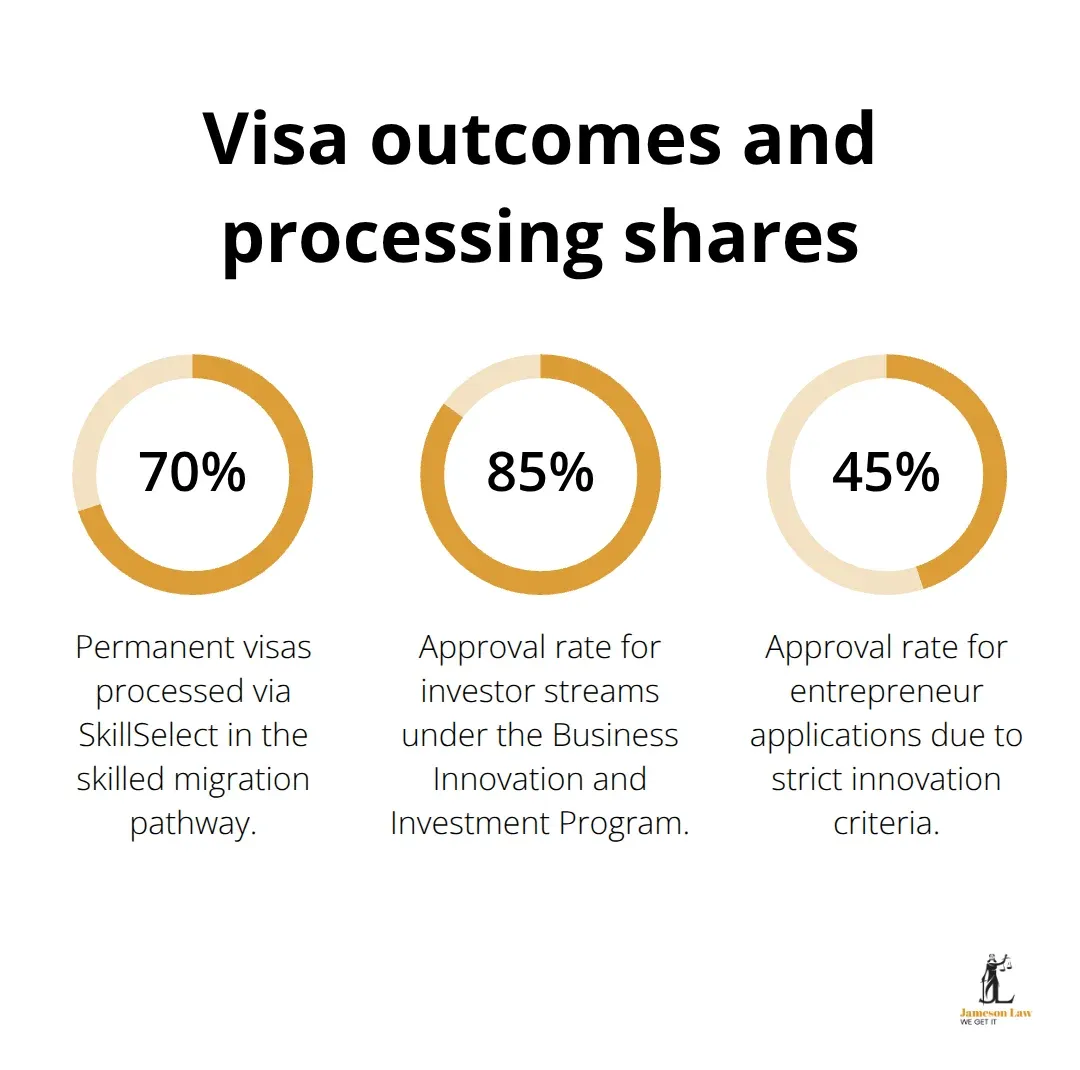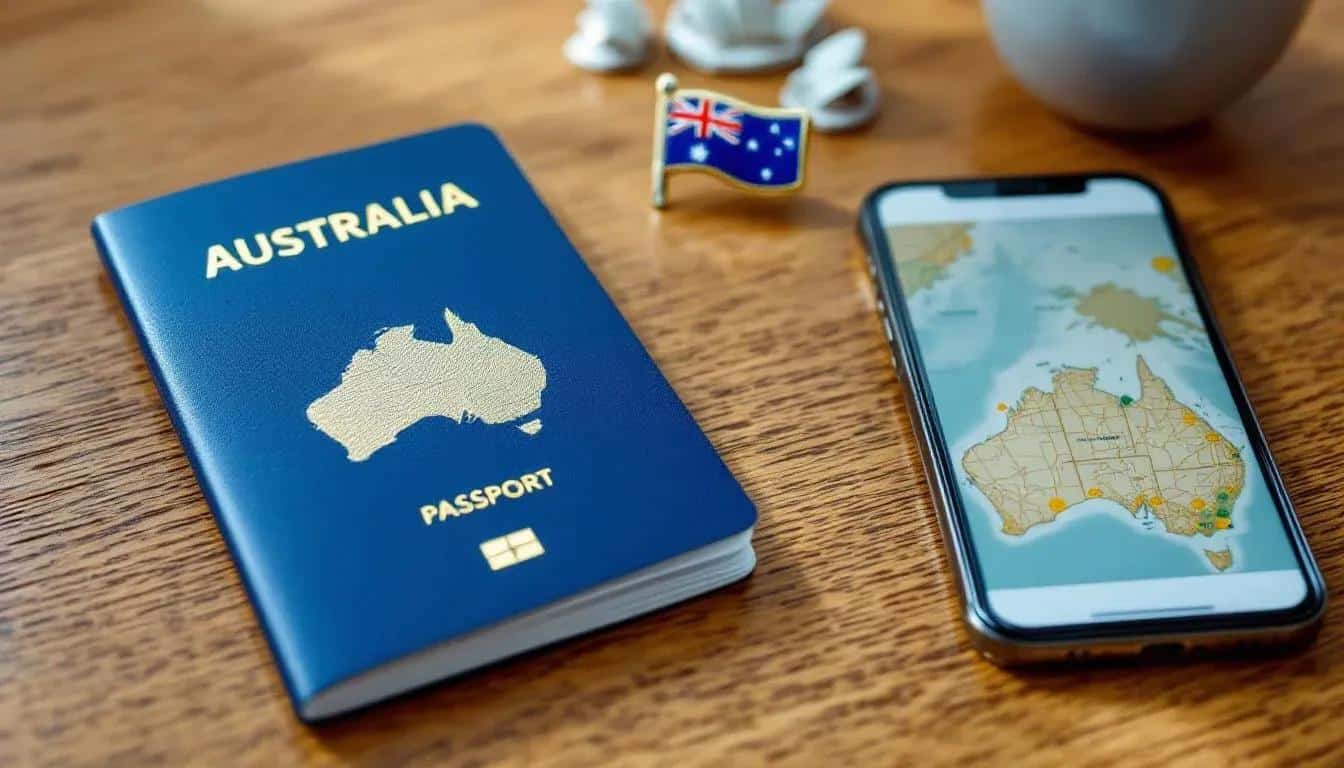Australia consistently ranks among the world’s most desirable destinations for migrants, offering exceptional opportunities across multiple sectors.
The benefits of migration to Australia extend far beyond economic advantages, encompassing world-class healthcare, education systems, and diverse lifestyle options.
We at Jameson Law, as expert immigration lawyers in Sydney and Parramatta, guide thousands of individuals through Australia’s complex immigration landscape each year, helping them access these life-changing opportunities.
Economic Opportunities and Career Growth
Australia’s economic landscape provides substantial financial advantages for skilled migrants, with median hourly earnings of $40.00 as of August 2024. This represents a significant premium compared to many developed nations, particularly for professionals in healthcare, engineering, and information technology sectors. The Australian Taxation Office data reveals that migrants in skilled occupations earn approximately 15% more than the national average within their first five years of arrival. Software engineers command salaries between $95,000 and $140,000 annually, while registered nurses earn $70,000 to $95,000, reflecting the strong demand across critical industries.
Labour Market Strength Creates Unprecedented Opportunities
The Australian labour market demonstrates remarkable resilience with unemployment rates at 4.5% as of the latest data. Jobs and Skills Australia reports over 400,000 job vacancies nationwide, with healthcare accounting for 180,000 positions and professional services contributing 85,000 openings. Regional areas like Western Australia and Queensland offer even greater opportunities, with mining and construction sectors providing premium wages up to 30% above metropolitan rates. The government’s Skills Priority List identifies 286 occupations facing acute shortages, creating fast-track pathways for qualified migrants.

Machinery operators and drivers remain in particularly high demand across these growing sectors.
Business Investment Landscape Rewards Entrepreneurship
Australia’s business environment ranks fourth globally according to the World Bank’s Ease of Doing Business index. The Business Innovation and Investment Visa program provides direct permanent residency pathways. Small business ownership among migrants reaches 23% (compared to 18% for Australian-born residents), demonstrating the entrepreneurial success rate. The Australian Small Business and Family Enterprise Ombudsman reports that migrant-owned businesses contribute $120 billion annually to the economy, with technology start-ups showing particularly strong growth in Sydney and Melbourne innovation hubs.
Professional Development and Career Advancement
Australian employers actively invest in workforce development, with companies spending an average of $2,400 per employee on professional training annually. The Australian Skills Quality Authority (ASQA) recognises international qualifications through formal assessment processes, allowing migrants to leverage their existing expertise. Professional associations across industries (including Engineers Australia and the Australian Computer Society) provide pathways for skills recognition and career advancement. Many migrants report salary increases of 25-40% within three years of arrival, particularly in specialised fields where skills shortages persist. Legal professionals find excellent opportunities, with Sydney lawyer jobs offering competitive salaries and career growth across multiple practice areas.
These economic advantages form just one pillar of Australia’s appeal, with the country’s exceptional quality of life and comprehensive social systems offering equally compelling reasons for migration. A migration agent in Parramatta can assess your eligibility.
Quality of Life and Living Standards
Australia’s Medicare system provides comprehensive healthcare coverage at zero cost for permanent residents, with bulk-billing rates that reach 77% for general practitioner visits. This translates to immediate access to medical services, specialist consultations, and hospital treatments without upfront payments. The Pharmaceutical Benefits Scheme (PBS) reduces prescription medication costs to a maximum of $49.50 per item for general patients and $8.10 for concession card holders. Private health insurance premiums average $2,000 annually for families, which provides additional benefits like private hospital rooms and reduced wait times for elective surgery. The Australian Institute of Health and Welfare reports that healthcare expenditure per capita stands at $6,031, which delivers outcomes that rank Australia fifth globally for life expectancy at 83.2 years.
World-Class Education Opens Doors for Children
Australian public schools operate tuition-free for permanent residents, with government expenditure of $13,764 per primary student and $16,203 per secondary student annually. The Programme for International Student Assessment (PISA) ranks Australian students 16th globally in literacy, 29th in mathematics, and 17th in science, which outperforms the United States and United Kingdom in multiple categories. University education remains accessible through the Higher Education Contribution Scheme (HECS), which allows students to defer fees until their income reaches $48,361. Eight Australian universities feature in the global top 100, with the University of Melbourne and Australian National University that consistently rank within the top 50 worldwide.

Vocational education through TAFE institutes costs between $1,000 and $15,000 per course, which provides direct pathways to skilled employment in trades and technical fields.
Climate Diversity Creates Year-Round Lifestyle Benefits
Australia spans multiple climate zones, from tropical Queensland to temperate Tasmania that ranges 11-21°C throughout the year. This diversity allows residents to choose locations that match their lifestyle preferences, whether they seek beach communities along 36,000 kilometres of coastline or mountain regions for snow sports and bushwalks. The Bureau of Meteorology confirms that major cities experience over 260 sunny days annually, which supports outdoor activities and reduces seasonal affective disorders common in northern hemisphere countries. Air quality indices consistently rate Australian cities among the world’s cleanest, with Sydney that averages 7.3 and Melbourne 9.8 on the global Air Quality Index scale (where lower numbers indicate better air quality).
These exceptional standards of healthcare, education, and environment complement Australia’s structured pathways to permanent residency, which offer multiple routes for skilled professionals, families, and investors to establish their new lives. Regional areas provide additional benefits with high quality of life, less congestion, and lower living costs.
Immigration Pathways and Visa Options
Australia’s immigration system operates through three primary streams that target different applicant profiles and circumstances. The skilled migration pathway processes 70% of all permanent visas through the SkillSelect system, which ranks candidates based on age, English proficiency, work experience, and qualifications. Applicants aged 25-32 receive maximum age points (30), while those with superior English scores gain 20 points compared to 10 points for competent English. An immigration lawyer in Sydney can help you calculate your points.

The Subclass 189 visa requires invitation scores that currently range from 80-90 points depending on occupation demand.
Points System Determines Skilled Migration Success
The current points test heavily favours younger professionals with Australian qualifications or work experience. Candidates with Australian study credentials earn 5-20 additional points, while those with 12 months Australian work experience gain 5 points. State nomination through Subclass 190 visas adds 5 points and requires specific occupation demand in nominating states. Western Australia prioritises healthcare workers and engineers, while Victoria focuses on technology professionals and trades workers. Processing times average 8-12 months for complete applications, with skills assessments that add 3-6 months to the timeline.
Family and Partner Visas Offer Alternative Routes
Partner visas process 47,000 applications annually through temporary-to-permanent pathways that require genuine relationship evidence and sponsor eligibility. The Department of Home Affairs demands comprehensive documentation including joint financial commitments, cohabitation proof, and relationship timeline evidence that spans 12 months minimum. Parent visas face significant delays with contributory options that cost $47,755 per applicant but process within 2-4 years, while non-contributory streams cost $4,185 but involve 30-year wait periods. Child visas process faster at 14-20 months for dependent children under 18, which makes family reunion viable for younger families who establish Australian residence.
Business Investment Streams Target Entrepreneurs
Business and investment visas attract high-net-worth individuals through the Business Innovation and Investment Program. The Investor stream requires $2.5 million investment in compliant investments for four years, while the Significant Investor stream demands $5 million commitment. Entrepreneur visas target innovative business concepts with $200,000 funding from third parties and provisional approval from Austrade. Success rates vary significantly, with investor streams that achieve 85% approval compared to 45% for entrepreneur applications due to strict innovation requirements.
Final Thoughts
The benefits of migration to Australia create exceptional opportunities across economic, social, and lifestyle dimensions for skilled professionals and families. Australia delivers median wages of $40.00 per hour, maintains unemployment at 4.5%, and offers over 400,000 job vacancies nationwide. The Medicare system provides comprehensive healthcare coverage while world-class education systems support children through tuition-free public schooling and globally ranked universities.
Australia’s immigration pathways accommodate diverse circumstances through skilled migration programs, family reunion options, and business investment streams. Complex visa requirements demand professional expertise to maximise success rates and avoid costly delays. Processing times vary significantly between visa categories, with skilled migration that averages 8-12 months and partner visas that require extensive documentation of genuine relationships.
We at Jameson Law provide expert immigration legal services in Sydney and Parramatta to help clients achieve successful outcomes across all visa categories. Our tailored approach addresses individual circumstances while maintaining compliance with immigration regulations. Professional legal guidance proves essential for securing Australia’s life-changing opportunities and establishing permanent residency pathways.
Disclaimer
The above is general legal information and should not be considered legal advice. You should speak with one of our lawyers for legal advice tailored to your specific legal matter. The courts and tribunals deal with matters on a case-by-case basis. Our lawyers are based in Parramatta and Sydney, we cannot assist with legal advice in a range of jurisdictions whether in Melbourne, Brisbane, Adelaide or Perth.













